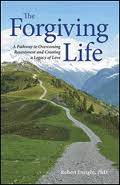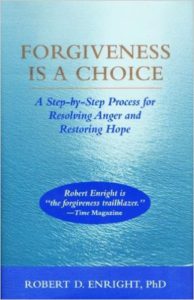Helpful Forgiveness Hint
On Contemplating the Forgiveness Process to “Do No Harm”
 There is a part of the forgiving process that we have described in two distinct publications, The Forgiving Life and Forgiveness Is a Choice, where we ask the forgiver to “Do no harm” to the one who has been unfair. In actuality, the concept of “Do no harm” serves as a bridge to the much more challenging task of loving someone who has wronged you. Even though it’s an earlier and purportedly simpler step in the process, “Do no harm” is anything but simple.
There is a part of the forgiving process that we have described in two distinct publications, The Forgiving Life and Forgiveness Is a Choice, where we ask the forgiver to “Do no harm” to the one who has been unfair. In actuality, the concept of “Do no harm” serves as a bridge to the much more challenging task of loving someone who has wronged you. Even though it’s an earlier and purportedly simpler step in the process, “Do no harm” is anything but simple.
 Three things are meant by “do no harm”: 1) Don’t try to deliberately hurt the person who offended you (such as being impolite); 2) Don’t do covert harm (such as sneering, ignoring at a gathering, or remaining impartial toward this one who shares personhood with you); and 3) Don’t hurt other people because of your inner discontent from the one who was unfair to you. Stated differently, it is surprisingly simple to channel your resentment toward Person X onto Persons Y and Z. Perhaps it is a sign that you are projecting anger from a past encounter onto your present interactions if people have to inquire, “What is wrong with my friend today?”
Three things are meant by “do no harm”: 1) Don’t try to deliberately hurt the person who offended you (such as being impolite); 2) Don’t do covert harm (such as sneering, ignoring at a gathering, or remaining impartial toward this one who shares personhood with you); and 3) Don’t hurt other people because of your inner discontent from the one who was unfair to you. Stated differently, it is surprisingly simple to channel your resentment toward Person X onto Persons Y and Z. Perhaps it is a sign that you are projecting anger from a past encounter onto your present interactions if people have to inquire, “What is wrong with my friend today?”
It’s wise to assess your level of resentment at these moments and consider who you should forgive today. Consider asking yourself: As I offer forgiveness, am I “doing no harm”? Because of what I am going through, am I exercising caution so as not to hurt innocent people?
I’m offering you a challenge today: Don’t hurt anyone today. Do the same tomorrow. Do it the day after that.
![]()
Know and Practice Bearing the Pain
When you suffer from another’s injustice, if you quietly endure that suffering, you are giving a gift to those around you by not passing on anger, frustration, or even hatred to them. Too often, people tend to displace their own frustrations and angers onto unsuspecting others. These others, then, end up inheriting the original person’s internal wounds because this person refused to bear the pain him- or herself.
I am not saying here that it is good to shoulder psychological depression or unhealthy anger by being silent and keeping it all in. On the contrary, here is the point: What happened to you is now a reality. It did happen and you cannot change that. You have inherited a certain amount of pain from another person. What will you now do with that pain? Will you try to toss it onto someone else in the hope that it somehow leaves you? Or, will you accept that this hurtful event in fact happened and you will not now pass the pain down the line to others? Consider taking this perspective in bearing the pain:
“If I can shoulder this pain now, I will not be passing it on to other people, even innocent people who never had anything at all to do with the original offense. My anger could be transferred to innocent people and they, in turn, could pass on this anger to someone else, who passes it to someone else, and down the generations my anger goes. Do I want that? Do I want my anger to live on as it is transferred for many years to come? I can prevent this from happening as I decide, today, to bear the pain that came my way.
I will not call what happened to me ‘good.’ It was not. But I will do my best to shoulder it, and, paradoxically, that pain is likely to start lifting from my shoulders as I accept it now. This pain is not forever and my bearing the pain may help reduce it faster.”
Reminder: As you bear the pain of what happened to you, you may be protecting others and future generations from your anger.
Robert
Enright, Robert. 8 Keys to Forgiveness (8 Keys to Mental Health), excerpt from Chapter 6. W. W. Norton & Company.
Checking in Regarding Your Unfolding Love Story
At the beginning of this year, we posted a reflection here in which we encouraged you to grow in love as your legacy of 2017.
One way to start is by looking backward at one incident of 2017 so far.
Please think of one incident with one person in which you were loved unconditionally, perhaps even surprised by a partner or a parent or a caring colleague.
Think of your reaction when you felt love coming from the other and you felt love in your heart and the other saw it in your eyes. What was said? How were you affirmed for whom you are, not necessarily for something you did? What was the other’s heart like, and yours?
Can you list some specific, concrete ways in which you have chosen love over indifference? Love over annoyance? If so, what are those specifics and how are they loving? We ask because 2017 is about 25% over. Have you engaged in 25% of all the loving responses that you will leave in this world this year?
This exercise is meant to show you this: You know love. Now the key is to persevere and deliberately strive to love on a daily basis.
Tempus fugit. If you have not yet deliberately left love in the world this year, there is time…..and the clock is ticking.
Robert
A Reflection on “Do No Harm”
In the process of forgiveness that we have outlined in two different books (Forgiveness Is a Choice and The Forgiving Life) there is one part of the process in which we ask the forgiver to “Do no harm” to the one who has been unjust. This idea of “Do no harm” is actually transitional to the even more difficult challenge to love the one who has hurt you. Yet, “Do no harm,” even though an earlier and supposedly easier part of the process, is anything but easy.
To “Do no harm” means three things: 1) Do not do obvious harm to the one who hurt you (being rude, for example); 2) Do not do subtle harm (a sneer, ignoring at a gathering, being neutral to this fellow human being); and 3) Do not do harm to others. In other words, when you are angry with Person X, it is easier than you think to displace that anger onto Persons Y and Z. If others have to ask, “What is wrong with her (him) today?” perhaps that is a cue that you are displacing anger from one incident into your current interactions.
It is at these times that it is good to take stock of your anger and to ask, “Whom do I need to forgive today? Am I ‘doing no harm’ as I practice forgiveness? Am I being vigilant not to harm innocent others because of what I am suffering?”
My challenge to you today: Do no harm to anyone throughout this entire day…..and repeat tomorrow…..and the day after that.
Robert
Helpful Forgiveness Hint
We sometimes think that those who hurt us have far more control over us than they actually do. We often measure our happiness or unhappiness by what has happened in the past.
My challenges to you today are these: Your response of forgiveness now to the one who hurt you can set you free from a past influence that has been toxic. Try to measure your happiness by what you will do next (not by what is past). Your next move can be this–to love regardless of what others do to you.
Robert



